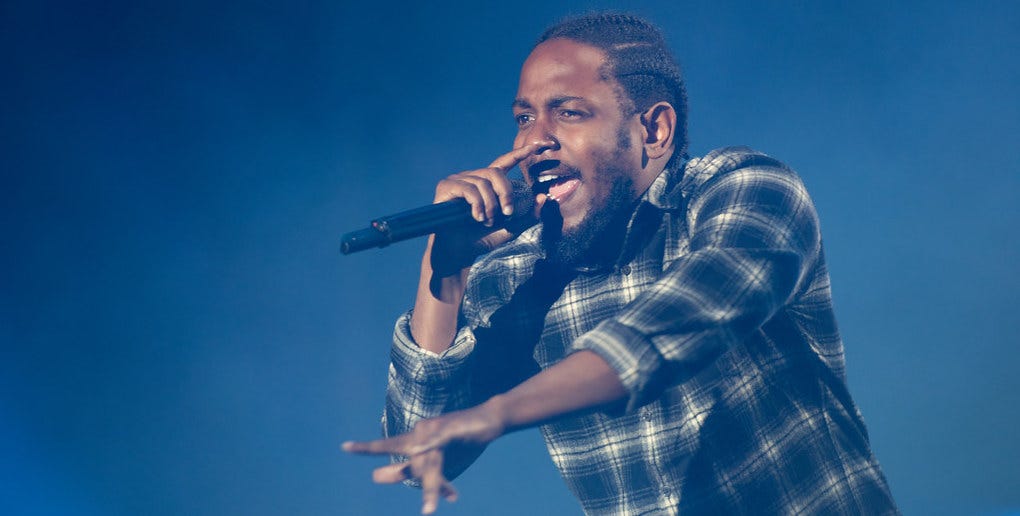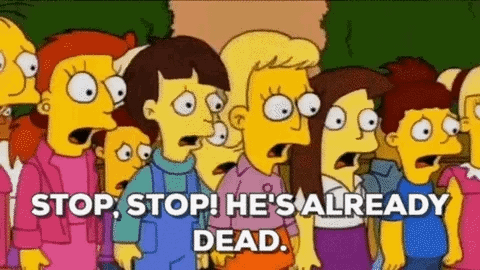“Is it true? Is it kind? Is it necessary?”
Someone once advised me to ask myself these three questions before saying anything in life. Words can hurt, as we all know. When the mega-sized hip-hop feud between artists Kendrick Lamar and Drake erupted this spring–attracting coverage from CNN and the New York Times–I wondered if this advice also applies to diss tracks.
Here’s a quick rundown of events: Last fall, rapper J. Cole claimed in a song with Drake that he, Drake, and Kendrick Lamar constitute the “Big 3” in rap music. While that might seem harmless enough, Kendrick Lamar responded this spring by releasing “Like That,” one of his several now-hugely popular diss tracks that are laser-focused on eviscerating Drake’s reputation and career. The hits have kept coming from Lamar, with more diss tracks produced in shockingly little time. The feud has opened a real can of worms: It seems that Lamar has wanted to air his grievances with Drake for a long while.
In his diss tracks Kendrick Lamar calls Drake a child sexual predator surrounded by a staff of like-minded criminals who secretly wish for Drake’s demise. Lamar also calls Drake a talentless hack and a terrible parent. He accuses Drake of secretly fathering a second love child (there’s already one).
Drake has responded with a comparatively meager few diss tracks in which he calls Lamar an unfaithful husband, a bad father, and a domestic abuser. These songs are cutting, but they are no match for Lamar’s white-hot anger and word-smithing skills.
Lamar is widely viewed as the feud’s indisputable victor, and he is now experiencing an entirely new level of fame and public recognition. But was it worth it? What has Kendrick Lamar really won here?
Lamar has long portrayed himself as the thinking person’s rapper, a man who eloquently decries social inequality and systemic racism. Lamar’s hyper-intellectual, complicated rap music explores in dense, discursive detail the many dimensions of the Black American experience. Many of Lamar’s songs come with literal sociology or history lessons. He is insistently moralizing, but not in the saccharine, I-don’t-cuss style of Will Smith. Lamar also insists on maintaining his connection with his roots–he grew with a gang-affiliated father and at times unhoused in Compton, California. Repeatedly Lamar lets listeners know that no amount of success will make him forget his origins.
Lamar is rap-but-make-it-art-school, and he has been snubbed at important moments of his career by the Grammys, which have a history of ignoring the contributions of rap and hip-hop to American music. In an unorthodox turn of events, in 2018 Lamar was awarded a Pulitzer Prize–somebody had to correct this oversight.
Lamar’s Pulitzer win was poetic justice–which is the name of one of Lamar’s hit songs, from 2012 (Drake actually appeared on it). In keeping with Lamar’s more highbrow cultural brand, President Obama, who was then in office, is a known fan of Lamar’s. In 2015 he named Lamar’s “How Much a Dollar Cost” his favorite song of 2015.
In “Poetic Justice,” Lamar calls his music poetry. Lamar raps, “There's blood in my pen.” Poetry can be hard to write and even harder to sell. It’s not that Kendrick Lamar hasn’t had hits or megastar collaborators–he has. But until now, Lamar had nowhere near the cultural footprint of his rival Drake, a Canadian rapper whose slick hip-hop tracks consistently–and seemingly effortlessly–outsell and out-win competitors. Drake’s music is less sophisticated and probing than Kendrick Lamar’s. The deepest question Drake often asks is whether life exists beyond wild amounts of fame and money. Yet Drake has more name recognition.
Drake’s beats possess a listenability and also a certain dulling ennui. He frequently complains about women who only desire him for his money. Drake’s recent hit “Slime You Out” is a good example. By contrast, Kendrick Lamar’s music takes effort to consume. That sophisticated quality elevates the art but hurts Lamar commercially. Listening to Kendrick Lamar can be onerous–until now, when Lamar is doing the sliming.
My suspicion is that what has really gotten under Lamar’s skin is that Drake’s product gets more attention than his own, despite the more sophisticated, even superior, quality of Lamar’s work. Lamar says as much in “Not Like Us”: “Sometimes you gotta pop out and show n—s.”
I think that Lamar’s diss tracks are intended as an expression of dominance rather than some show of righteous indignation. After all, if Lamar really believed the allegations that Drake is a predator–if he really cared–this great moralizer would have reported Drake to the authorities instead of making tracks whose scalding lyrics are currently being shouted gleefully at bars.
These diss tracks have simple time signatures and short lengths, yet Kendrick Lamar can’t resist Kendrick Lamar-ing. “Not Like Us” includes a nerdy, random detour into the historical importance of Atlanta for Black Americans. Lamar is brainy and he will never be able to fully disguise that.
In “Like That,” Lamar raps that instead of the “Big 3,” well, “It's just big me.” In the same song, Lamar says that Prince outlived Michael Jackson. It’s an apt analogue—Prince and Michael Jackson were rivals. Prince’s music is perhaps critically “better,” but it is also way less accessible and thus less well-known than Jackson’s. Besides, personality matters. To quote Michael Jackson: “Prince is a meanie.”
Of the two rappers, Drake is Jewish. I asked Rabbi Ysoscher Katz, an outspoken presider over lively, thought-provoking online conversations about Judaism, his opinion of the feud. The issue here, Rabbi Katz explained, is whether or not the claims in the diss tracks are true. If they are true, then Lamar is guilty of lashon hara, or evil speech. If they are false, Lamar is committing what’s called motzi shem ra–slander, or defamation. If Kendrick Lamar has real evidence of criminality, Rabbi Katz said, he should of course report Drake to the police, not create diss tracks.
Rabbi Katz noted that in Judaism it is a very serious transgression to publicly shame a person. In fact this sin is actually treated as a capital crime, since embarrassing someone publicly is seen as a form of murder. When you shame people publicly, it is as if you are killing them. Indeed, the videos of crowds joyfully chanting Lamar’s lyrics do conjure up images of dancing on a grave.
Rabbi Katz did point out, though, that diss tracks are endemic–even required–in the rap industry. Diss tracks are part of the job, and that would potentially affect a halakhic ruling. “The culture of rap is when people diss each other…I’m not saying it’s a license to do everything but…anybody who gets into this line of work knows that…that’s a work hazard. Sometimes people are going to diss each other.”
Some disses are worse than others, though, right? There are allegations of criminality, but then there’s Kendrick Lamar’s diss that there’s no “Big 3,” just “big me.” Where does that insult fall?
“It is a shtickel [Yiddish, a little bit of a] diss,” Rabbi Katz confirmed.
Here’s a shtickel diss. If I were Drake, I would have said something to Lamar along the lines of: Listening to your music is like doing homework or eating vegetables, and that’s why you’re not as popular as I am. I know what you’re thinking: Wow, what a burn. She’s got a future in professional rap. Anyways, Lamar has sung, “I make music that electrify 'em, you make music that pacify 'em.” That may be so, but it seems like Lamar wants more–hence the diss tracks.
I completely understand how Lamar feels. In any industry, it is incredibly frustrating to feel as if your creations go unnoticed. No matter what kind of prestige or status you may already have, there will always be someone who is doing less and seemingly getting more. I think about that with my own writing–I’m too small, no one reads it, it’s too late. I should have started earlier. And on and on.
Yet I remind myself that to change one person’s life really is changing the world. Your words, your creations, can have a much greater impact than you realize. If you can separate the desires of your ego–for more clicks, sales, Instagram likes–from what you probably really want–to leave a legacy, to have an impact–things start to look different. You have to trust that at any point in time, you are reaching exactly the right people. They are finding you and benefiting from what you have to share, and that means something.
It is so easy to feel that despite our best efforts, no one is noticing. But we all influence each other, all the time. We should remember to tell the people who have positively impacted us just how much they mean to us. Yet even if you’re not hearing that deeply meaningful feedback, it needs to be enough to trust that your work is seen and valued.
I’m not a diss-track abolitionist. Diss tracks of all kinds have their place among people in the same industry or social network when important conflicts need to be resolved. Sometimes bad opinions need to be taken down and in a public manner. Yet how you do it matters.
I know many thoughtful people who think that restraint is actually, you know, pretty gangsta. I wish they made the headlines more often.







Really interesting and insightful!! I have generally gone by the idea that if I hadn’t heard the artist by the time I turned 30 I wasn’t interested in listening to them. So I hadn’t heard Lamar. But I will give him a shot.
One thing I do know about Drake by reputation is that he is among one of the biggest thieves in the music industry. It sounds like there has been tremendous amount of resentment against him which probably plays into why the diss has gone over so well.
Your comment on how your writing is being received obviously really resonates for me. It has been extremely helpful to think that whatever we create is reaching exactly who needs it at the moment they find it. The beautiful thing about writing is that people can discover it years or decades after it was written and it can still resonate. Yes music can be timeless but that is trickier than the timelessness of writing.
Your writing continues to inspire me and your focus on sharing positively is a great reminder to always share the best aspects of us.